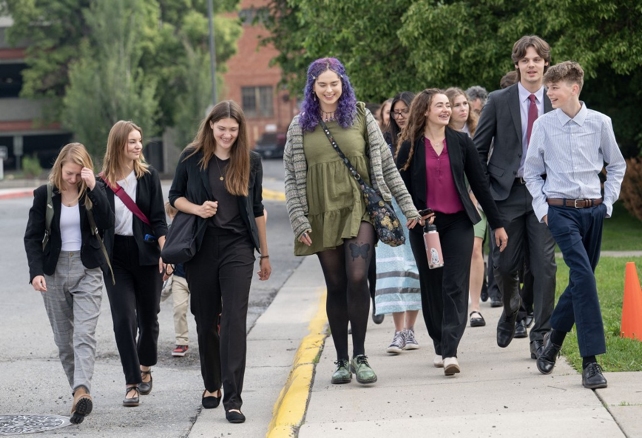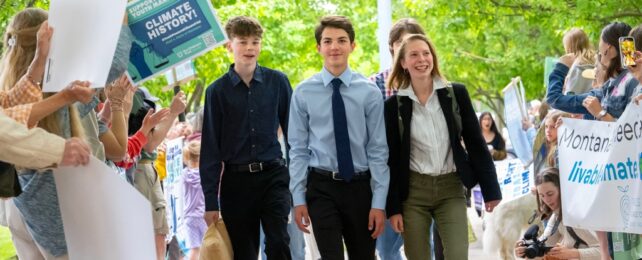In a landmark climate trial, a Montana court on Monday ruled in favor of a group of youths who accused the western US state of violating their rights to a clean environment.
District Court Judge Kathy Seeley said a state law preventing agencies from considering the impacts of greenhouse gases when issuing permits for fossil fuel development was unconstitutional.
The case, Held v. State of Montana – brought by 16 plaintiffs ranging in age from five to 22 – has been closely watched because it could bolster similar litigation that has been filed across the country.
"By prohibiting analysis of GHG0 (greenhouse gas) emissions and corresponding impacts to the climate… the MEPA (Montana Environmental Policy Act) Limitation violates Youth Plaintiffs' right to a clean and healthful environment and is unconstitutional on its face," Seeley wrote.
"Plaintiffs have a fundamental constitutional right to a clean and healthful environment, which includes climate as part of the environmental life-support system," Seeley added in her more than 100-page ruling.

The closely watched case was the first involving a constitutional claim against a state and also represented a rare instance in which climate experts were questioned on the witness stand.
Julia Olson, executive director of the nonprofit Our Children's Trust, which represented the plaintiffs, welcomed the ruling as a "huge win for Montana, for youth, for democracy, and for our climate."
"Today, for the first time in US history, a court ruled on the merits of a case that the government violated the constitutional rights of children through laws and actions that promote fossil fuels, ignore climate change, and disproportionately imperil young people," Olson said.
"As fires rage in the West, fueled by fossil fuel pollution, today's ruling in Montana is a game-changer that marks a turning point in this generation's efforts to save the planet from the devastating effects of human-caused climate chaos," she said in a statement.
'Dystopian movie'
Emily Flower, spokeswoman for Montana attorney general Austin Knudsen, denounced the ruling and said the state would appeal.
"This ruling is absurd, but not surprising from a judge who let the plaintiffs' attorneys put on a weeklong taxpayer-funded publicity stunt," Flower said.
"Montanans can't be blamed for changing the climate — even the plaintiffs' expert witnesses agreed that our state has no impact on the global climate," she added.
At the heart of the case was a provision within fossil fuel-friendly Montana's constitution that says: "The state and each person shall maintain and improve a clean and healthful environment in Montana for present and future generations."
The youths said they had been harmed by the "dangerous impacts of fossil fuels and the climate crisis," with children "uniquely vulnerable" to its worsening impacts.
During closing arguments, Nate Bellinger of Our Children's Trust said his clients were asking the state government to "embrace its constitutional responsibility to alleviate the harms of its own conduct."
"The plaintiffs acknowledge that the work to stop and reverse climate change will be a lifetime journey, but they are asking this court for help," he said.
Montana assistant attorney general Michael Russell on the other hand argued that energy policy should be decided by the people through their elected representatives.
Russell said that while the state accepted that man-made emissions were responsible for warming, expert witnesses had not been able to quantify the extent to which Montana's laws were responsible.
The trial began on June 12 and concluded a few days earlier than expected after Montana declined to call to the stand several experts, including its only climate scientist, Judith Curry.
Over the course of the proceedings, the court heard testimony from the plaintiffs about ways their health, emotional wellbeing, family finances and cultural traditions had been affected.
Lead plaintiff Rikki Held, 22, whose family runs a ranch in Montana, said that their livelihoods and quality of life had been increasingly impacted by wildfires, extreme temperatures and drought.
Claire Vlases, 20, said: "When I think about summer, I think about smoke. It sounds like a dystopian movie, but it's real life."
